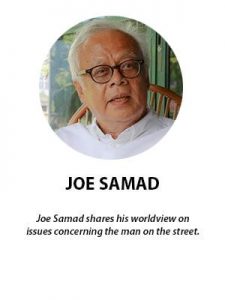Borneo states will be the biggest losers of GE15

Playing each other to gain advantage at the federal level has weakened the Borneo states. Until there is a united force of Borneo states, rogue party leaders in Peninsular Malaysia will still be in control.
(FMT) – The coming general election is not the “mother of all general elections” as some might wish to describe it. Make no mistake, these parliamentary elections are about self-preservation, of Umno leaders trying to avoid prosecution on corruption charges.
It is good to remember that “mother” as a political appellation was used by Saddam Hussein of Iraq describing war with the United States as the “mother of all battles”, after which he was obliterated by the allied coalition.
For GE15, the biggest losers are the Borneo states as the two states are insignificant on the national stage. Sabah and Sarawak are just minnows in a big pond having no say in shaping the country’s politics.
Umno still controls the country’s politics and hopes to call the shots in Putrajaya.
Gabungan Parti Sarawak (GPS) proudly claims to be a “‘kingmaker”, having contributed 18 MPs to provide a four-seat majority for the government led by Ismail Sabri Yaakob of Umno.
However, Sabah and Sarawak have succumbed to the Umno gang led by Ahmad Zahid Hamidi who pushed for a snap general election.
It made no difference that GPS as a local party successfully shut Umno out of the state. However unpopular it is among the general populace, Umno is still in control when it comes to calling for elections or dissolving state assemblies.
The situation is not far different in Sabah, led by a Bersatu government under the banner of Gabungan Rakyat Sabah (GRS) which is beholden to Putrajaya.
Bersatu, led by Muhyddin Yassin, performed poorly in the Melaka and Johor state elections.
Umno-BN is not part of GRS but is currently “cooperating” while waiting in the wings, eager to take control of parliamentary seats in Sabah from Bersatu and others, and form the new federal government.
The only party that can stem the Umno tide is Warisan, but without its former election partners PKR, DAP, and Upko, Warisan will have an uphill struggle to capture the 25 parliamentary seats and at the same time make the ambitious or some say foolhardy attempt at inroads into the Malay heartland.
Borneo can be a political force if united
The only way Sabah (with 25 parliamentary seats) and Sarawak (with 31) can be kingmakers is through a united front of their combined 56 seats in Parliament.
Playing each other to gain advantage at the federal level has weakened the Borneo states. Until there is a united force of Borneo states, rogue party leaders in Peninsular Malaysia will still be in control.
Three successive governments have tried to appease Sabah and Sarawak with small gains in terms of state rights under the Malaysia Agreement 1963, such as issuing of licences and permits and Sarawak’s consolation of renaming the title of chief minister to one of “premier”.
Even with a premier, it is Petronas who still controls Sarawak’s oil and gas resources.
The MA63 agenda to become equal partners, an autonomous region (wilayah), and receive equitable revenue sharing will have to wait another day. With every budget announcement, Sabah and Sarawak complain that the allocations are insufficient for its development and that as “partners” of Malaysia they should get more.
PH promised the sky
In 2018, the PH government promised the sky and 20% oil royalty for Sabah and Sarawak. When pressed to deliver, Dr Mahathir Mohamad said Petronas would go bankrupt and Lim Guan Eng said there was no money to pay Sabah and Sarawak.
There was a negotiation of “21 new points” on MA63 by a special committee, and even with the “three wise men”, Mahathir, Abang Johari Openg and Shafie Apdal huddling together, there was little to no results.
It was reported that 17 out of the 21 points tabled under PH were agreed upon with another four remaining. Later, the matter was put under the Official Secrets Act, and the story ended there.
In August, Petronas declared a RM50 billion dividend to the federal government, double the RM25 billion it paid last year. This does not include taxes paid to the government. Sabah and Sarawak got their fixed 5% and none of the profit sharing despite being major oil and gas producers.
The reinstatement of Article 1(2) of the Federal Constitution reverting Sabah and Sarawak’s status to category (b), has not changed the fortunes of the Borneo states. Sabah is still the poorest state in Malaysia.
The state leaders are still harping on MA63 issues and it’s like flogging a dead horse. Many are fed up with talk and more talk on MA63 by Sabah and Sarawak politicians who are long on promises and short on delivery.
Successive governments have failed Sabah and Sarawak
Sabah has not got its 40% revenue-sharing formula and it is unlikely to get it in the near future due to the huge amount owed by the federal government and interpretations of the clause and calculation.
It’s good to be reminded that successive governments have not delivered. With any new government in place, the negotiations will have to start all over again.
In some countries, elections bring change but in Malaysia we get the same leaders we voted for. The national parties of today are not concerned about people’s plight or quality of life, they are concerned about their own self preservation.
They will be there to visit their constituents when it comes to funerals, birthdays, disasters and special events but when it comes to development, tough luck.
We all agree that Malaysia is in great need of a shakeup. The people rallied in 2018 to change the government. Can they do it again?

